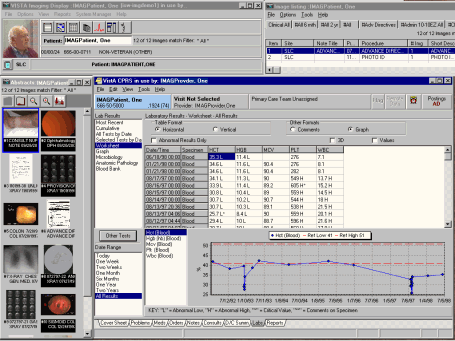Why US Healthcare sucks and how I’m trying to change it
The healthcare system in the U.S. clearly blows. Just take a look at the latest government shutdown over it.
I’m going to try and give a general outline of what I see in healthcare today, why so much of it sucks, and how I think it should actually work.
First, let’s tackle the elephant in the room. Electronic Health Records. The first of these popped up as computers became more widespread, the most famous of which is Epic Systems. To give you an idea of what their UI is like you can check out this image or their current website
Long story short, EHRs suck. None of them match the workflow most doctors have. Because of these usability problems, EHR adoption in the U.S. has been growing at a snail’s pace, even though there have been several studies showing that adopting an EHR can improve the quality of patient care. I’ve heard dozens of stories from nurses who have complained that after adopting an EHR, their workload at the end of the day has gone from 5 minutes of filing papers, to an hour of clicking through screens. Sometimes technology isn’t the answer.
These EHRs have been so difficult to use that many institutions have refused to adopt them until the Affordable Care Act (Obamacare) implemented regulations that fined institutions exponentially the longer they waited to adopt an EHR. So thank god, now we have more doctors dealing with Epic on a daily basis.
OK, so enough about EHRs. Let’s talk a little about how Obamacare changes the economics of healthcare by changing it from a fee-for-service to a fee-for-treatment model. That’s a bunch of fancy words to basically say the following.
Old Model:
Jim has a heart attack and has triple bypass surgery
His doctor gets $20k to operate on him
Jim is released but doesn’t improve his habits and has another heart attack
His doctor gets another $20k to operate on him
New Model:
Jim has a heart attack and has triple bypass surgery
His doctor gets $30k to operate on him and manage his care
If Jim has another heart attack, his doctor is financially on the line for that surgery
Basically, the doctor gets more money on the first visit which he then should use to try and guarantee that Jim doesn’t relapse.
These two clauses of Obamacare, forcing EHRs and changing the financial model, are causing doctors to scramble to adjust their workflow and adopt new technologies to manage their patients once they leave the office.
I think there’s a huge gaping hole in the design of this system. Whenever a patient visits a healthcare institution, they are essentially coming in blind. They don’t own any of their personal health data and entirely rely on the doctor to have enough information from his own system to make an informed decision. Patients have absolutely no control over how this data is stored, or how to send it from one institution to another. Ever had to transfer MRI results from one hospital to another? If you’re lucky they’ll have a fax machine, but normally they snail-mail a printed version of the results which is then manually entered on the other end.
Obamacare is expecting doctors to manage their patients once they leave the office, while keeping patients blind as to what’s going on with their health. Yes, there are personal patient portals, but those only have the records of what happened while you were at the institution. Your personal health is a continuous narrative, not a snapshot of some treatments you’ve had.
Obamacare is a nice idea, but it’s not tackling some of the core problems with our current healthcare system. It’s a step in the right direction at least.
One of my fundamental driving beliefs is that this system needs to be flipped on its head in order to run efficiently. Patients need to be the CEOs of their own personal health, and they need to be the owners of all of their data. Whether that’s your latest hip surgery or the number of steps you took reported by your Jawbone, YOU need to be the owner of the data, not the healthcare institution where you received the treatment.
I want to one day build a clinic run without an EHR. All of the personal health data of a patient will be stored on their phone. Each time they come into the office, they’ll give OAuth access to one of our physicians (Similar to how you give Facebook Apps access to your personal info, you’ll give doctors access to your personal health data). You get diagnosed with high blood pressure? We’ll recommend a personal blood pressure medical device to continuously track it and recommend you share that data with us and your family members.
I’m trying to build this future one step at a time with Nightingale. Today we launched our caregiver-facing application. This app is targeted to both family caregivers, like the daughter tracking her mom with Alzheimer’s, and professional caregivers, like a nurse managing hundreds of patients at a time.
Right now the only data being reported and collected by Nightingale is medication adherence. In the next couple of weeks we’ll be launching integrations with some of the more popular wearable technologies such as the Jawbone UP and the iHealth Blood Pressure monitor.
Check us out at nightingaleapp.com and tell me what you think.
We’re only just getting started.
